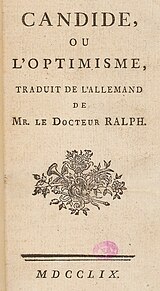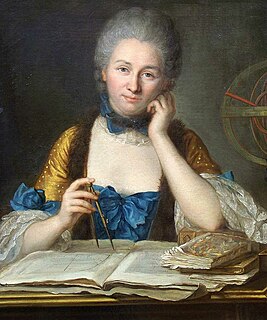
Candide, ou l'Optimisme is a French satire first published in 1759 by Voltaire, a philosopher of the Age of Enlightenment. The novella has been widely translated, with English versions titled Candide: or, All for the Best (1759); Candide: or, The Optimist (1762); and Candide: Optimism (1947). It begins with a young man, Candide, who is living a sheltered life in an Edenic paradise and being indoctrinated with Leibnizian optimism by his mentor, Professor Pangloss. The work describes the abrupt cessation of this lifestyle, followed by Candide's slow and painful disillusionment as he witnesses and experiences great hardships in the world. Voltaire concludes Candide with, if not rejecting Leibnizian optimism outright, advocating a deeply practical precept, "we must cultivate our garden", in lieu of the Leibnizian mantra of Pangloss, "all is for the best" in the "best of all possible worlds".

Denis Diderot was a French philosopher, art critic, and writer, best known for serving as co-founder, chief editor, and contributor to the Encyclopédie along with Jean le Rond d'Alembert. He was a prominent figure during the Enlightenment.

Gabrielle Émilie Le Tonnelier de Breteuil, Marquise du Châtelet was a French natural philosopher, mathematician, physicist, and author during the early 1730s until her untimely death due to childbirth in 1749. Her most recognized achievement is her translation of and commentary on Isaac Newton's 1687 book Principia containing basic laws of physics. The translation, published posthumously in 1759, is still considered the standard French translation today. Her commentary includes a profound contribution to Newtonian mechanics—the postulate of an additional conservation law for total energy, of which kinetic energy of motion is one element. This led to her conceptualization of energy as such, and to derive its quantitative relationships to the mass and velocity of an object.
Evelyn Beatrice Hall, who wrote under the pseudonym S. G. Tallentyre, was an English writer best known for her biography of Voltaire entitled The Life of Voltaire, first published in 1903. She also wrote The Friends of Voltaire, which she completed in 1906.

The Dictionnaire philosophique is an encyclopedic dictionary published by Voltaire in 1764. The alphabetically arranged articles often criticize the Roman Catholic Church, Judaism, Islam, and other institutions. The first edition, released in June 1764, went by the name of Dictionnaire philosophique portatif. It was 344 pages and consisted of 73 articles. Later versions were expanded into two volumes consisting of 120 articles. The first editions were published anonymously in Geneva by Gabriel Grasset. Due to the volatile content of the Dictionnaire, Voltaire chose Grasset over his usual publisher to ensure his own anonymity. There were many editions and reprints of the Dictionnaire during Voltaire's lifetime, but only four of them contained additions and modifications. Furthermore, another work published in 1770, Questions sur l'Encyclopédie, which contained reshaped and modified articles from the Encyclopédie always in alphabetical order, led many following editors to join this and the Dictionnaire in a unique opus. The Dictionnaire was a lifelong project for Voltaire. It represents the culmination of his views on Christianity, God, morality and other subjects.

James J. Cramer is an American television personality, former hedge fund manager, and best-selling author. Cramer is the host of CNBC's Mad Money and a co-founder of TheStreet.com.

Floyd Cramer was an American Hall of Fame pianist who was one of the architects of the Nashville sound. He was known for his "slip note" piano style, in which an out-of-key note slides into the correct note.

JohannBaptist Cramer was an English pianist and composer of German origin. He was the son of Wilhelm Cramer, a famous London violinist and conductor, one of a numerous family who were identified with the progress of music during the 18th and 19th centuries.
Épître à l'Auteur du Livre des Trois Imposteurs is an epistle in verse form written by Voltaire and published in 1770. It is a letter to the anonymous writers and publishers of the Treatise of the Three Impostors. It contains one of the most famous Voltaire quotes, "If God hadn't existed, it would have been necessary to invent him." This quote itself was famously countered by the 19th-century Russian revolutionary Mikhail Bakunin in his book God and the State with "If God really existed, it would be necessary to abolish him."

Pieter Cramer, was a wealthy Dutch merchant in linen and Spanish wool, remembered as an entomologist. Cramer was the director of the Zealand Society, a scientific society located in Flushing, and a member of Concordia et Libertate, based in Amsterdam. This literary and patriotic society, where Cramer gave lectures on minerals, commissioned and/or financed the publishing of his book De uitlandsche Kapellen, on foreign (exotic) butterflies, occurring in three parts of the world Asia, Africa and America.

David Geddes Hartwell was an American critic, publisher, and editor of thousands of science fiction and fantasy novels. He was best known for work with Signet, Pocket, and Tor Books publishers. He was also noted as an award-winning editor of anthologies. The Encyclopedia of Science Fiction describes him as "perhaps the single most influential book editor of the past forty years in the American [science fiction] publishing world".
Chappell & Co. was an English company that published music and manufactured pianos.
The Friends of Voltaire, written by Evelyn Beatrice Hall under the pseudonym S. G. Tallentyre, was published in 1906. In 1907 it was published in Great Britain under the author's own name by G. P. Putnam's Sons. This classic work about Voltaire was still being printed nearly 100 years later in 2003.
What It Takes: The Way to the White House (ISBN 9780394562605) is a book about the 1988 United States presidential election, written by Richard Ben Cramer. It was published in 1992. It follows the campaigns of Republicans George Herbert Walker Bush and Bob Dole and Democrats Joe Biden, Michael Dukakis, Dick Gephardt, and Gary Hart.

Countess Maria Aurora von Königsmarck was a Swedish and German noblewoman of Brandenburg extraction and mistress of Augustus the Strong, Elector of Saxony and King of Poland.
The Treatise on Tolerance on the Occasion of the Death of Jean Calas from the Judgment Rendered in Toulouse is a work by French philosopher Voltaire, published in 1763, in which he calls for tolerance between religions, and targets religious fanaticism, especially that of the Jesuits, indicting all superstitions surrounding religions.
Gebrüder Borntraeger Verlagsbuchhandlung is a scientific publisher covering the fields of Botany, Earth and Environmental Sciences.
La Femme qui a Raison, is a verse comedy in three acts written by Voltaire in 1749. The play was first performed in 1749 at a feast in honour of Stanisław Leszczyński in the castle of Lunéville and first published in 1759.

Artémire was Voltaire's second tragedy in five acts. When it failed at its premiere on February 15 1720 at the Comédie-Française, Voltaire withdrew it and cancelled the printing.












